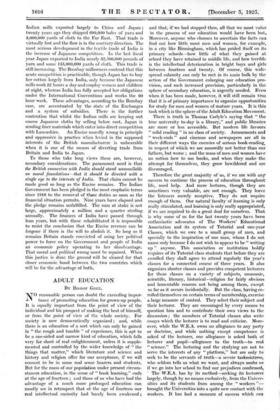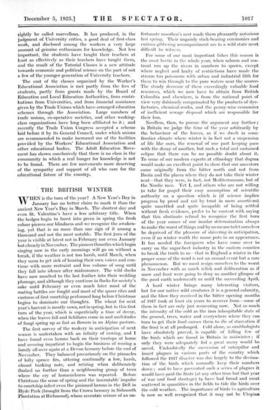ADULT EDUCATION
BY BISHOP GORE.
NO reasonable person can doubt the exceeding impor- tance of promoting education for grown-up people. It is equally important from the point of view of the individual and his prospect of making the best of himself, or from the point of view of the whole society. For society is now democratically organized ; and, while there is an education of a sort which can only. be gained in " the rough and tumble " of experience, this is apt to be a one-sided and narrow kind of education, which falls very far short of real enlightenment, unless it is supple- mented and controlled by the wider knowledge of " the things that matter," which literature and science and history and religion offer for our acceptance, if we will consent to be in some real sense hearers and students; But for the mass of our population under present circum- stances education, in the sense of " book learning," ends at the age of fourteen ; and those of us who have had the advantage of a much more prolonged education can mostly see in retrospect that at the age of fourteen our real intellectual curiosity had barely been awakened ; and that;- if we had stopped-then,- alt that we most value in the process of our education would have been lost. Moreover, anyone who chooses to ascertain the facts can find out how little most men and women, for example, in - a n city like Birmingham, which has prided itself on its primary schools----how little of what they gained at school they have retained in middle life, and how terrible is the intellectual deterioration in bright boys and girls' between fourteen and twenty. Of course, this wide- spread calamity can only be met in its main bulk by the action of the Government enlarging our education pro- vision, and such increased provision, particidarly in the sphere of secondary education, is urgently needed. Even when it has been made, however, it will still remain true that it is of primary iniportance to organize opportunities for study for men and women of mature years. It is this task which is the sphere of the Adult Education Movement. There is truth in Thomas Carlyle's saying that " the true university to-day is a library," and public libraries are more or less accessible. But modern life favours " solid reading " in no class of society. Amusements and " week-ends " and cinemas and newspapers are all in their different ways the enemies of serious book-reading, in respect of which we are assuredly not better than our fathers, but worse ; and the mass of men and women have no notion how to use books, and when they make the attempt for themselves, they grow bewildered and are discouraged.
Therefore the great majority of us, if we are with any success to continue the process of education throughout life, need help. And mere lectures, though they are sometimes very valuable, are not enough. They leave the listeners merely receptive. They do not require enough of them. Our natural faculty of learning is only , . really stimulated, and learning is only really approkiated, if we are required to do a great deal for ourselves. That is why some of us for the last twenty years have been enthusiastic advocates of The Workers' Educational Association and its system of Tutorial and one-year Classes, which we owe to a small group of men, and specially to the inspiration of one man, whom I do not name only because I do not wish to appear to be " writing up " anyone. This association or institution boldly requires of its Tutorial class students that before they are enrolled they shall agree to attend regularly the year's classes for a connected course of three years. It also organizes shorter classes and provides competent lecturers for these classes on a variety of subjects, economic, scientific, literary, historical=religion for fairly obvious and lamentable reasons not being among them, except so far as it occurs incidentally. But the class, having en- rolled themselves on certain terms of membership, exercise a large measure of control. They select their subject and their lecturer. They are encouraged by every means to questiod him and to contribute their own views to the discussion ; the members of Tutorial classes also write essays which the lecturer is to read and criticize. More- over, while the W.E.A. owns no allegiance to any party or doctrine, and while nothing except competence is asked of the lecturer, one allegiance is asked both of lecturer and pupil—allegiance to the truth—ta real " science.", The lecturing and the studying are not to serve the interests of any " platform," but are only to seek to be the servants of truth—a severe taskmistress, who seldom tells us what, we want, and akvays snubs us if we go into her school to find our prejudices confirmed.
The has by its method=seeking its lecturers" largely, though by no means exclusively, from the Univer- sities and its students from among the, " workers "- brought the Universities into a quite new contact with the workers. It has had a measure of success which can rightly be called marvellous. It has produced, in the ' judgment of University critics, a good deal of first-class work, and disclosed among the workers a very large amount of genuine enthusiasm for knowledge. Not less important, the students have taught their teachers at least as effectively as their teachers have taught them, and the result of the Tutorial Classes is a new attitude towards economic and political science on the part of not a few of the younger generation of University teachers.
The cost of the classes organized by the Worker's Educational Association is met partly from the fees of students, partly from grants made by the Board of Education and Local Education Authorities, from contri- butions from Universities, and from financial assistance given by the Trade Unions which have arranged education schemes through the Association. Large numbers of :trade unions, co-operative societies, and other working- class organizations have long been affiliated to it ; and ,recently the Trade Union Congress accepted a scheme laid before it by its General Council, under which unions are recommended to make increased use of the facilities provided by the Workers' Educational Association and other educational bodies. The Adult Education Move- ment has shown conclusively that there is no class in the community in which a real hunger for knowledge is not to be found. There are few movements more deserving of the sympathy and support of all who care for the .educational future of the country.



































































 Previous page
Previous page